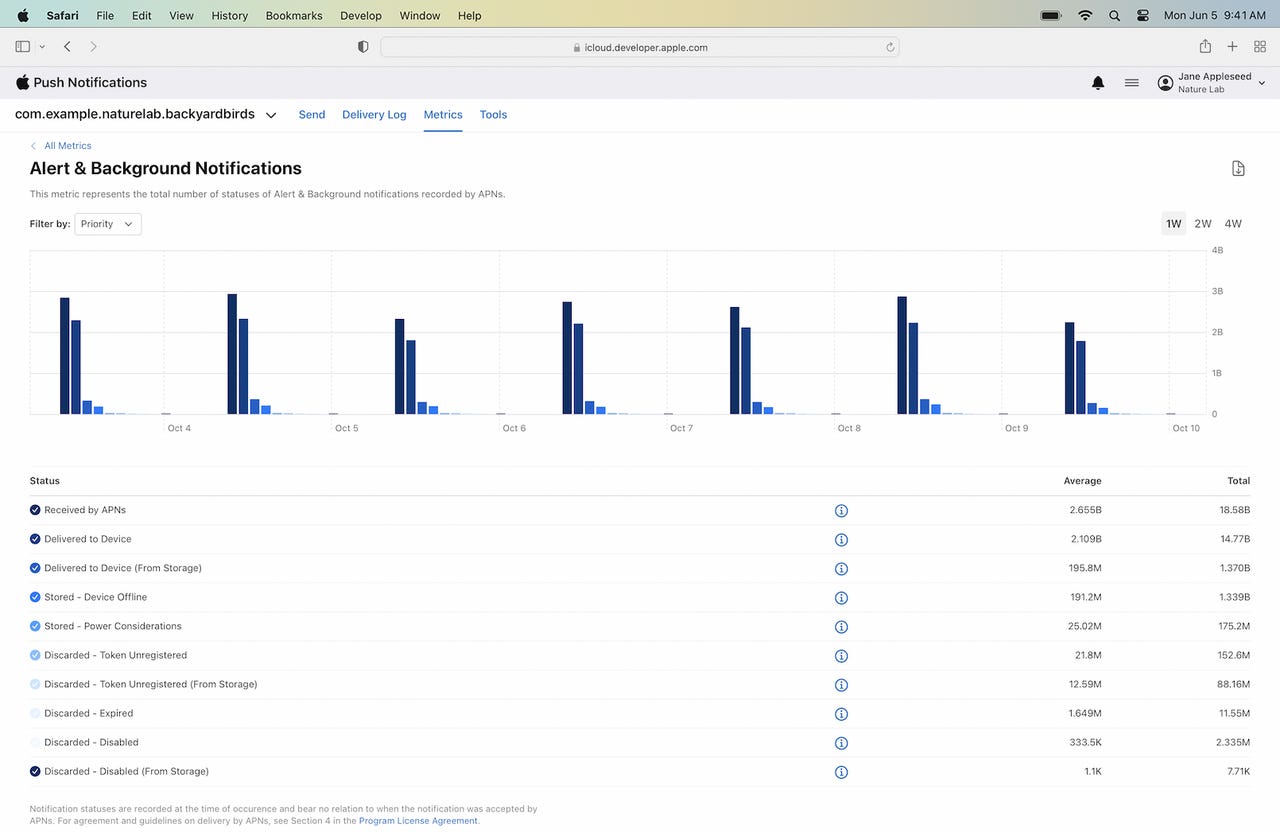
































A view into the new metrics pane in the Push Notification Console.
Screenshot by David Gewirtz/The average US smartphone user gets about 46 push notifications a day, according to app analysis firm Business of Apps. OK, let's do some math: There are more than 1.46 billion active iPhone users worldwide. Roughly 46 notifications times a billion and a half users nets out to about 67 billion notifications a day -- or a whopping 24 and a halftrillionnotifications sent out each year.
With that many messages being sent through the ether, it's a good thing that Apple has been updating its notification management tools.
Also: Apple's new dev program to provide support for iOS 17, VisionOS, and more
While Apple iOS notifications have been around since 2009, it's only this year at WWDC that Apple introduced its Push Notifications Console, a tool for developers to use for managing, debugging, and testing notifications. Yesterday, the company announced a new feature for that Console: notification metrics. Apple says developers can now get an "aggregated view of delivery statuses and insights into various statistics for notifications, including a detailed breakdown based on push type and priority."
Notifications provide real-time updates from apps and websites directly to a user's iOS device, which provides useful information to the user and increases engagement and overall app usage. Many users have come to rely on our notifications to stay in touch or manage important projects.
Apple notifications are managed by the Apple Push Notification service (APNs). When an app first interacts with you, it asks for permission to send you notifications. If you agree to accept them, a unique token is generated by APNs and sent to your device. This token identifies you, making it possible for you, and only you, to get your notifications. Then, the token is registered with whatever application server the app developer uses to manage the app's online presence.
When an app wants to send a notification, its application server sends a request to the APNs with the token ID, and then the APNs manages delivery to your device. It's a pretty slick and robust mechanism.
Using the Push Notifications Console, developers can test out notifications without needing to make them work in code first. In this way, they can tune their notifications, see how they work on devices, and test --and only then have to code the interface into their app. This can be a big time-saver.
Also: Mystery bug causes iPhones to randomly turn off for several hours at night
A second key feature introduced at this year's WWDC is the ability to examine notification delivery logs, which helps developers understand why a notification might not have been delivered. This can be very helpful, not only in the development phase but also after app deployment, if it turns out that expected notifications are not being seen by users.
The Push Notifications Console also provides tools for testing and generating authentication keys, and checking the validity and scope of the individual device tokens assigned between an app and a given device.
Now, with the addition of notification metrics to the Console, developers can receive information by time period, showing a day, a week, or a month. Details on average and total notifications recorded by APNs include:
Also: Software developers work best in teams. Here's how AI is helping
This data can prove very helpful to developers because they'll be able to see how their notifications are being handled between APNs and user devices.
Apple's Push Notification Console is available to anyone registered as a developer in the Apple Developer program.
You can follow my day-to-day project updates on social media. Be sure to subscribe to my weekly update newsletter on Substack, and follow me on Twitter at @DavidGewirtz, on Facebook at Facebook.com/DavidGewirtz, on Instagram at Instagram.com/DavidGewirtz, and on YouTube at YouTube.com/DavidGewirtzTV.
 Tags quentes :
Negócio
Revelador
Tags quentes :
Negócio
Revelador